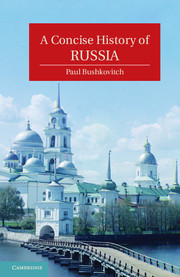Book contents
- Frontmatter
- Contents
- List of Figures
- Abbreviations
- Acknowledgments
- Prologue
- 1 Russia before Russia
- 2 Moscow, Novgorod, Lithuania, and the Mongols
- 3 The Emergence of Russia
- 4 Consolidation and Revolt
- 5 Peter the Great
- 6 Two Empresses
- 7 Catherine the Great
- 8 Russia in the Age of Revolution
- 9 The Pinnacle of Autocracy
- 10 Culture and Autocracy
- 11 The Era of the Great Reforms
- 12 From Serfdom to Nascent Capitalism
- 13 The Golden Age of Russian Culture
- 14 Russia as an Empire
- 15 Autocracy in Decline
- 16 War and Revolution
- 17 Compromise and Preparation
- 18 Revolutions in Russian Culture
- 19 Building Utopia
- 20 War
- 21 Growth, Consolidation, and Stagnation
- 22 Soviet Culture
- 23 The Cold War
- Epilogue
- Further Reading
- Index
10 - Culture and Autocracy
Published online by Cambridge University Press: 05 June 2012
- Frontmatter
- Contents
- List of Figures
- Abbreviations
- Acknowledgments
- Prologue
- 1 Russia before Russia
- 2 Moscow, Novgorod, Lithuania, and the Mongols
- 3 The Emergence of Russia
- 4 Consolidation and Revolt
- 5 Peter the Great
- 6 Two Empresses
- 7 Catherine the Great
- 8 Russia in the Age of Revolution
- 9 The Pinnacle of Autocracy
- 10 Culture and Autocracy
- 11 The Era of the Great Reforms
- 12 From Serfdom to Nascent Capitalism
- 13 The Golden Age of Russian Culture
- 14 Russia as an Empire
- 15 Autocracy in Decline
- 16 War and Revolution
- 17 Compromise and Preparation
- 18 Revolutions in Russian Culture
- 19 Building Utopia
- 20 War
- 21 Growth, Consolidation, and Stagnation
- 22 Soviet Culture
- 23 The Cold War
- Epilogue
- Further Reading
- Index
Summary
One of the ironies of the reign of Nicholas I is that his unrelenting autocracy presided over the first great age of Russian culture. Nicholas realized to some extent the growing importance of Russian culture and the extremely high level it achieved in a short time, but he was more concerned to direct it in the proper conservative channels than to celebrate it. He abrogated the more tolerant censorship system of Alexander I in favor of one with the emphasis on combating subversion in religion and politics while retaining the paternalistic aspects of the older laws. The new structure remained under the Ministry of Education, but included a greater role for the bureaucracy and the more ominous Third Section. Its head, Alexander von Benckendorff, exercised erratic and arbitrary authority over publications while clumsily trying to encourage the appearance of pro-government material. Even with writers and artists well disposed toward the state, this policy was largely a failure, for Russian society was beginning to grow away from court and state tutelage, a process too fundamental for the actions of the tsar to stop. Some of the changes were even the result of state policy, particularly the support of the universities and the gymnasia, which produced a much larger and educated public, eager for the products of the new Russian culture. Another factor was the growth of commercial capitalism, which gradually brought into being a market for books and journals, concentrated in Petersburg and Moscow but slowly spreading to the provinces as well.
The cultural explosion took place in a number of areas. Painting and the visual arts remained largely bound to the Academy of Fine Arts in St. Petersburg and thus indirectly to the court and its network of patronage. The Academy continued to favor large historical, classical, and Biblical canvases over the increasingly popular landscape and genre painting. It continued to supply paintings for official building projects like St. Isaac's Cathedral in St. Petersburg, or the Church of Christ the Savior in Moscow. Nevertheless the Academy also offered for its students and graduates some possibility of travel and long residence in Italy, and many painters and sculptors took advantage of the opportunity. Karl Briullov, the best of the academy painters, returned from Italy and obtained many contracts for the decoration of churches and palaces as well as acquiring court and aristocratic patrons. Alexander Ivanov, in contrast stayed in Italy to avoid the halls of the Academy and fell under the influence of German romantic painting in its religious guise (the “Nazarenes”). The main result of his Italian years was an enormous painting, “Christ Appearing to the People,” which showed Nazarene influence but rejected the pseudo-medievalism of the Germans to depict the people whom Christ saved rather than a hieratic portrait of the Savior. Ivanov's innovations seem minor today, but in the world of Nicholas I he had a great impact.
- Type
- Chapter
- Information
- A Concise History of Russia , pp. 172 - 185Publisher: Cambridge University PressPrint publication year: 2011



